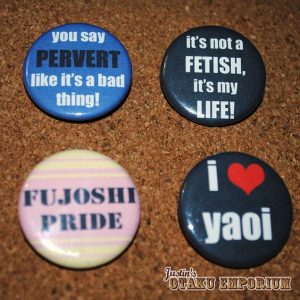So, over the length of this course, I’ve talked about several things. First, I talked about how feminism seeks to empower women and advocate for equality, while queer theory looks to break down the very ideas of gender and sex, and their roles in society. Next I talked about fujoshi, the women who are happily accepting society’s othering in favor of their own, redefined version of womanhood, which is much more sexually enterprising than femininity has traditionally been. Then, I talked about how BL as a genre is not just othered but does itself other. BL readers other gay men, picking and choosing which parts of the gay experience they wish to consume. In so doing, they push away the real gay experience, because it doesn’t fit their idyllic escapist literature. BL readers also other traditional femininity, except instead of magnifying the positives, they exacerbate the negatives, leaving femininity a weak, whiny label no one wants to take on.

So while that’s a brief overview of the BL phenomenon as a whole, that’s where it was as of the last batch of research papers to be published.
BL lives, like the rest of us, in the age of the internet, and is continuously changing as it subsumes media, voraciously consuming itself as an ever-morphing amalgamation of Western and Eastern culture. While scholars can look at the landscape of BL as it was five or ten years ago, when they started their research, where is BL right now, as of May 2017?
That’s a hard question to answer. In some ways, it’s the same as ever: othering gay men and feminine women, critiquing gender roles, and questioning traditional relationship dynamics, all with gratuitous helpings of self-indulgent pornography and sexual taboos. On the other hand, writers and readers of BL have become more and more outspoken against prejudice, with the publishing companies responding accordingly. Most scholarly papers have looked at BL manga from 2010 or earlier, but even in that relatively short time frame, fangirls have become more outspoken in their critiquing of rape culture and the suave alpha male character. They’re asking for discussions about consent and relationship ethics, and wondering why no one has put out a restraining order against the crazy guy who shoots first and asks questions later.
I’d to give some concrete examples of this.
Viewfinder, a long-running juggernaut in the BL manga world, represents everything about rape tropes and sexual objectification that critics of BL have a problem with. However, the ten year old series is no longer the the number one title in BL. Ten Count and Don’t Be Cruel to Me, two other series which are long-running and have swept up various awards, have acquired popularity on par with Viewfinder, and the newer generation they represent is encapsulated in the themes of these two newer works.
The works both represent more realistic relationships, with Don’t Be Cruel to Me seriously addressing rape and homophobia in Japan, and Ten Count addressing the relatively taboo topic of mental health while favoring the development of the characters over their sexual chemistry—though both of these are still highly adult and escapist in nature. Don’t Be Cruel to Me in particular reflects the changing times, as it started out nonconsensual—as you could probably infer by the risque title— and the characters’ relationship has since changed in response to the popular demands of the BL fandom. Now the couple is earnestly working towards clear communication and trust, and every chapter features a different challenge in their lives they have to overcome, sometimes as an individual, sometimes together.
However, it would be a mistake to look at these two works and decide that BL manga and its readers are suddenly wholesome, problem-free topics. We can’t simply label the BL fandom as wholly reformed, or even on the road to reformation. To say they’ve been shamed into morality and othered into following the rules would not be true at all. Rather, the nature of BL is simply morphing. With every step towards social justice, readers of BL take a step away from shame, meaning that while BL manga itself might not seem so taboo, its

fans seem more and more bizarre. The fujoshi presence in Japan is strong enough that there have been whole shows aired around the archetype, portraying fans of BL manga as deranged characters with an insatiable lust for homoeroticism, throwing away their social standing and reputation for any glimpse of guy-on-guy action.
So is there othering going on in BL manga? Yes. The fans are othered more than ever, and the genre is too varied to really draw any decisive conclusions about its overall morality. But is the othering going on within a total lack of self awareness when it comes to consuming the other for voyeuristic, sexual gain? That’s where the waters get murky. I would like to suggest that going forward, scholars going forward look more at society’s relationship with fujoshis than the morality of escapist literature. That’s not to say neglect looking at BL itself, but I do feel that fujoshis have been seen as dirty old men peeking at what they shouldn’t by more than enough authors looking to shame and other them. It’s time to look at what’s so shameful about men having sex and women enjoying watching it in the first place.